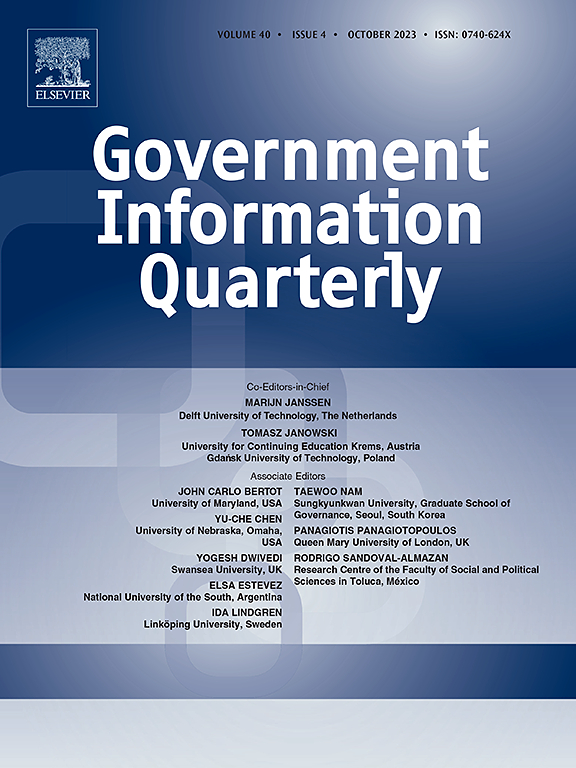数字政府的挤出效应:重塑公民与国家的关系
IF 10
1区 管理学
Q1 INFORMATION SCIENCE & LIBRARY SCIENCE
引用次数: 0
摘要
数字政府系统被广泛用于改善公共部门的绩效,但人们仍然担心它们可能会破坏隐私并扩大政府控制。本研究通过引入挤出效应的概念来挑战主流叙事,即数字政府实施积极增强公民自主性和减少政府自由裁量权的实例。利用1999年至2022年70个国家205个实施方案的独特数据集,我们使用文本挖掘和循证编码来确定674个经经验验证的效果。我们的分析表明,挤出效应不是孤立的异常现象,而是由分布式账本、去中心化计算和加密协议等新兴技术形成的系统现象。在这一发现的基础上,我们扩展了现有的数字政府效应分类,以更好地反映公民与公共行政之间不断演变的关系——捕捉扩大政府自由裁量权的侵入性效应和限制其自由裁量权的挤出性效应。这些发现为评估数字政府的福利影响提供了更全面的基础,并为将技术设计与民主治理相结合提供了新的工具。本文章由计算机程序翻译,如有差异,请以英文原文为准。
Extrusive effects of digital government: Reframing the citizen–state relationship
Digital government systems are widely adopted to improve public sector performance, yet concerns persist about their potential to undermine privacy and expand governmental control. This study challenges that prevailing narrative by introducing the concept of extrusive effects—instances where digital government implementations actively enhance citizen autonomy and reduce governmental discretion. Drawing on a unique dataset of 205 implementations across 70 countries from 1999 to 2022, we use text mining and evidence-based coding to identify 674 empirically verified effects. Our analysis reveals that extrusive effects are not isolated anomalies but constitute a systematic phenomena shaped by emerging technologies such as distributed ledgers, decentralized computing, and cryptographic protocols. Building on this discovery, we expand existing classifications of digital government effects to better reflect the evolving relationship between citizens and public administrations—capturing both intrusive effects that expand governmental discretion and extrusive effects that constrain it. These findings provide a more comprehensive foundation for evaluating digital government’s welfare implications and offer new tools for aligning technological design with democratic governance.
求助全文
通过发布文献求助,成功后即可免费获取论文全文。
去求助
来源期刊

Government Information Quarterly
INFORMATION SCIENCE & LIBRARY SCIENCE-
CiteScore
15.70
自引率
16.70%
发文量
106
期刊介绍:
Government Information Quarterly (GIQ) delves into the convergence of policy, information technology, government, and the public. It explores the impact of policies on government information flows, the role of technology in innovative government services, and the dynamic between citizens and governing bodies in the digital age. GIQ serves as a premier journal, disseminating high-quality research and insights that bridge the realms of policy, information technology, government, and public engagement.
 求助内容:
求助内容: 应助结果提醒方式:
应助结果提醒方式:


